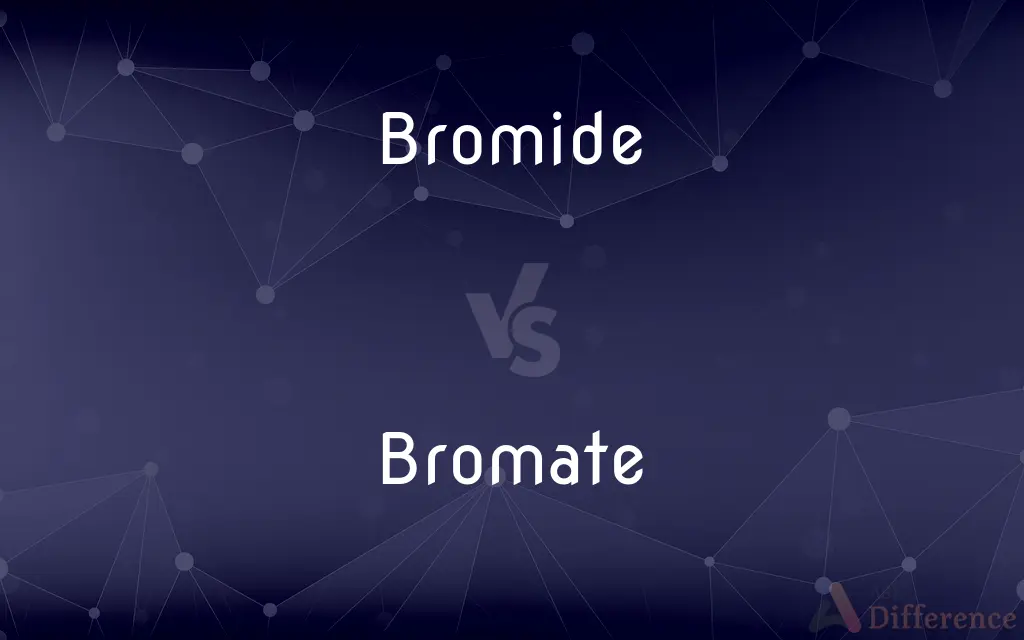Bromide vs. Bromate — What's the Difference?
By Urooj Arif & Fiza Rafique — Updated on March 12, 2024
Bromide is a negatively charged ion from bromine, often found in sedatives, whereas bromate is an oxidized form of bromine used in some baking processes.

Difference Between Bromide and Bromate
Table of Contents
ADVERTISEMENT
Key Differences
Bromide ions, coming from bromine, play roles in various industries, notably in pharmaceuticals where they've been used as sedatives. On the other hand, bromate ions are known for their oxidizing properties, finding applications in both water treatment and the baking industry, albeit with health concerns due to their potential carcinogenic effects.
While bromides are stable and less reactive, making them suitable for long-term applications in medicine and photography, bromates are highly reactive and are used in situations where a strong oxidizing agent is required. However, the use of bromates, especially in food and drinking water, is regulated due to health risks.
Bromide salts, such as potassium bromide, are used in various applications, including medical treatments for epilepsy and in photographic films. Conversely, potassium bromate is often used in the flour milling industry to strengthen dough but has faced significant scrutiny and regulatory bans in many countries due to its carcinogenic potential.
In terms of environmental impact, bromides are generally considered less harmful and are naturally occurring in the ocean. Bromates, however, can form as byproducts of water disinfection processes and pose a greater risk to water safety and public health.
Despite their differences, both bromides and bromates are important in their respective fields. Their usage and management, however, highlight the ongoing balance between technological benefits and environmental and health safety.
ADVERTISEMENT
Comparison Chart
Charge
Negative (-1)
Negative (-1)
Common Uses
Sedatives, photography
Water treatment, baking industry
Reactivity
Less reactive
Highly reactive
Health Concerns
Lower, used in medicine
Higher, potential carcinogen
Environmental Impact
Less harmful, naturally occurring
More harmful, regulated
Compare with Definitions
Bromide
Found in ocean waters.
Bromide ions are naturally occurring in seawater.
Bromate
A compound that can accept electrons and oxidize another compound.
Bromates are used in water treatment processes.
Bromide
Used to treat conditions like epilepsy.
Sodium bromide was used in medicine.
Bromate
Potential carcinogen when ingested.
The use of potassium bromate in food products is banned in many countries.
Bromide
A negatively charged ion of bromine.
Potassium bromide (KBr) is used in photography.
Bromate
An oxidized form of bromine.
Potassium bromate is added to flour to improve dough strength.
Bromide
Involvement in film and photography.
Silver bromide is used in photographic film.
Bromate
Applied in disinfection processes.
Bromates can form as byproducts in ozonated drinking water.
Bromide
A substance that induces sedation by reducing irritability or excitement.
Bromide salts were once common sedatives.
Bromate
Used to strengthen dough.
Bromate is used in small amounts in some bread recipes.
Bromide
A bromide ion is the negatively charged form (Br−) of the element bromine, a member of the halogens group on the periodic table.
Bromate
The bromate anion, BrO−3, is a bromine-based oxoanion. A bromate is a chemical compound that contains this ion.
Bromide
Univalent anionic bromine, or a compound of bromine, especially a binary compound of bromine with a more electropositive element.
Bromate
The inorganic polyatomic ion BrO3- or a compound containing it.
Bromide
Potassium bromide.
Bromate
To treat (a substance) chemically with a bromate.
Bromide
A commonplace remark or notion; a platitude.
Bromate
(inorganic chemistry) the anion BrO3-1, derived from bromic acid; any salt containing this anion
Bromide
A tiresome person; a bore.
Bromate
To treat with bromic acid or a bromate
Bromide
(inorganic chemistry) A binary compound of bromine and some other element or radical.
Bromate
A salt of bromic acid.
Bromide
(by extension) A dull person with conventional thoughts.
My adviser at college was a bromide who had not had an original thought in years.
Bromate
To combine or impregnate with bromine; as, bromated camphor.
Bromide
A platitude.
We hoped the speech would include reassurances, but instead it was merely one bromide after another.
Bromate
React with bromine
Bromide
(photography) A print made on bromide paper.
Bromate
Treat with bromine
Bromide
A compound of bromine with a positive radical.
Bromide
A person who is conventional and commonplace in his habits of thought and conversation.
The bromide conforms to everything sanctioned by the majority, and may be depended upon to be trite, banal, and arbitrary.
Bromide
A conventional or trite saying; - often used in the phrase "old bromide".
Bromide
Any of the salts of hydrobromic acid; used as a sedative
Bromide
A trite or obvious remark
Bromide
A sedative in the form of sodium or potassium bromide
Common Curiosities
Can bromate be found in drinking water?
Yes, bromates can form as byproducts in treated drinking water.
Are bromides safe?
Bromides are considered safe in controlled applications, such as in medicine and photography.
What is bromide used for?
Bromide is used in medical treatments, photography, and as a sedative.
Why is bromate considered harmful?
Bromate is a potential carcinogen and poses health risks when consumed.
How do bromides and bromates differ in reactivity?
Bromides are less reactive, while bromates are highly reactive due to their oxidizing properties.
What are common bromide compounds?
Common bromide compounds include potassium bromide and sodium bromide.
What is the main use of bromate in the baking industry?
Bromate is used to strengthen dough and improve the rise of bread.
What makes bromates effective in water treatment?
Their strong oxidizing properties make them effective in killing bacteria and viruses.
Are bromates naturally occurring?
While bromides are naturally found in seawater, bromates usually form through human activities or as byproducts.
Do both bromides and bromates have industrial uses?
Yes, both are used industrially but in different sectors and for different purposes.
Is there any regulation on the use of bromates?
Yes, the use of bromates, especially in the food industry, is regulated or banned in many countries.
How are bromides used in photography?
Bromides, like silver bromide, are used in photographic films for their light-sensitive properties.
What health concerns are associated with bromides?
While generally safe, excessive use of bromides can lead to side effects, but they are far less concerning than those associated with bromates.
Can bromates be removed from water?
Yes, water treatment processes can reduce bromate levels to meet safety standards.
What are the environmental impacts of bromides and bromates?
Bromides have minimal impact, being naturally occurring, whereas bromates pose a higher risk due to their toxicity and formation as byproducts in water treatment.
Share Your Discovery

Previous Comparison
Bash vs. Ash
Next Comparison
Juneberry vs. ServiceberryAuthor Spotlight
Written by
Urooj ArifUrooj is a skilled content writer at Ask Difference, known for her exceptional ability to simplify complex topics into engaging and informative content. With a passion for research and a flair for clear, concise writing, she consistently delivers articles that resonate with our diverse audience.
Co-written by
Fiza RafiqueFiza Rafique is a skilled content writer at AskDifference.com, where she meticulously refines and enhances written pieces. Drawing from her vast editorial expertise, Fiza ensures clarity, accuracy, and precision in every article. Passionate about language, she continually seeks to elevate the quality of content for readers worldwide.













































